2013高考英语 经典陷阱题大串讲 比较结构
高考英语 经典陷阱题大串讲 逗号
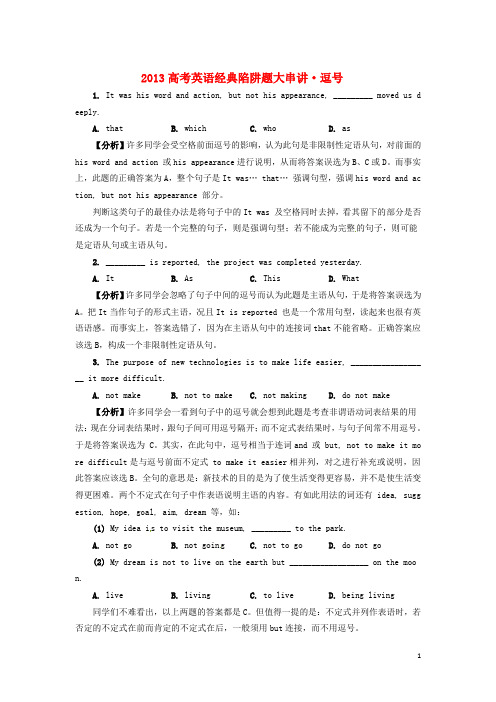
2013高考英语经典陷阱题大串讲·逗号1. It was his word and action, but not his appearance, _________ moved us d eeply.A. thatB. whichC. whoD. as【分析】许多同学会受空格前面逗号的影响,认为此句是非限制性定语从句,对前面的his word and action 或his appearance进行说明,从而将答案误选为B、C或D。
而事实上,此题的正确答案为A,整个句子是It was… that… 强调句型,强调his word and ac tion, but not his appearance 部分。
判断这类句子的最佳办法是将句子中的It was 及空格同时去掉,看其留下的部分是否还成为一个句子。
若是一个完整的句子,则是强调句型;若不能成为完整的句子,则可能是定语从句或主语从句。
2. _________ is reported, the project was completed yesterday.A. ItB. AsC. ThisD. What【分析】许多同学会忽略了句子中间的逗号而认为此题是主语从句,于是将答案误选为A。
把It当作句子的形式主语,况且It is reported 也是一个常用句型,读起来也很有英语语感。
而事实上,答案选错了,因为在主语从句中的连接词that不能省略。
正确答案应该选B,构成一个非限制性定语从句。
3. The purpose of new technologies is to make life easier, ________________ __ it more difficult.A. not makeB. not to makeC. not makingD. do not make【分析】许多同学会一看到句子中的逗号就会想到此题是考查非谓语动词表结果的用法:现在分词表结果时,跟句子间可用逗号隔开;而不定式表结果时,与句子间常不用逗号。
高考英语考点典型陷阱题分析 比较结构
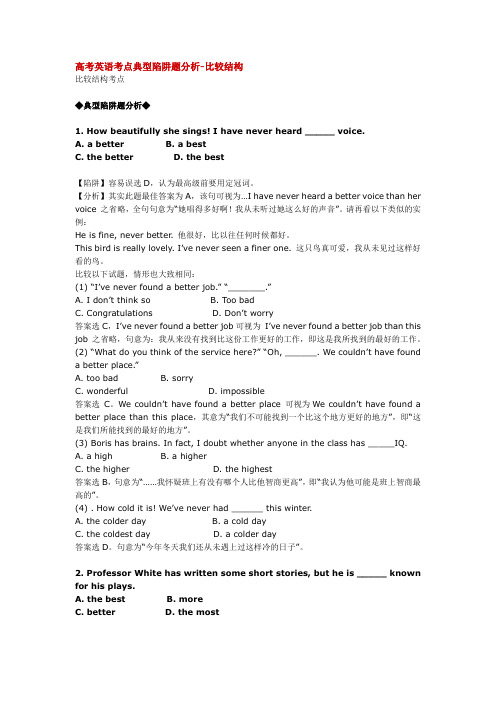
高考英语考点典型陷阱题分析-比较结构比较结构考点◆典型陷阱题分析◆1. How beautifully she sings! I have never heard _____ voice.A. a betterB. a bestC. the betterD. the best【陷阱】容易误选D,认为最高级前要用定冠词。
【分析】其实此题最佳答案为A,该句可视为…I have never heard a better voice t han her voice 之省略,全句句意为“她唱得多好啊!我从未听过她这么好的声音”。
请再看以下类似的实例:He is fine, never better. 他很好,比以往任何时候都好。
This bird is really lovely. I’ve never seen a finer one. 这只鸟真可爱,我从未见过这样好看的鸟。
比较以下试题,情形也大致相同:(1) “I’ve never found a better job.” “_______.”A. I don’t think soB. Too badC. CongratulationsD. Don’t worry答案选C,I’ve never found a better job可视为I’ve never found a better job than this job 之省略,句意为:我从来没有找到比这份工作更好的工作,即这是我所找到的最好的工作。
(2) “What do you think of the service here?” “Oh, ______. We couldn’t have founda better place.”A. too badB. sorryC. wonderfulD. impossible答案选C。
We couldn’t have found a better place 可视为We couldn’t have found a better place than this place,其意为“我们不可能找到一个比这个地方更好的地方”,即“这是我们所能找到的最好的地方”。
2013高考英语 经典陷阱题大串讲 情态动词

2013高考英语经典陷阱题大串讲·情态动词1.“Mike is often absent from class.” “Tell him he _________ answer for it if he goes on behaving like that.”A. shallB. willC. wouldD. can【陷阱】几个干扰项均有可能误选。
【分析】最佳答案选A。
shall 用作情态动词主要有以下两个用法:(1)用于疑问句中征求意见。
如:Shall I help you? 要不要我帮帮你?Shall I open the window? 要我把窗子打开吗?(2)用于陈述句中表示允诺、告诫、警告、威胁、命令、规定、必然性等(可用于各类人称)。
如:You shall suffer for this. 你会为此事吃苦头的。
(表威胁)Each competitor shall wear a number. 每个参赛者要戴一个号码。
(表规定)You shall hear everything as soon as you come. 你一来就可听到所有情况了。
(表允诺)请做以下试题(答案均选 shall):(1)“I promise that she _________ get a nice present on her birthday.”“W ill it be a great surprise to her?”A. shouldB. mustC. wouldD. shall2. You ________ pay too much attention to your reading skill, as it is so important.A. cannotB.shouldn’tC.mustn’tD.needn’t【陷阱】几个干扰项均有可能误选。
【分析】最佳答案选A。
cannot…too…是英语中一个十分有用的表达,意为“不可能太……,无论怎样……也不算过分,越……越……”。
高考英语陷阱题总结归纳
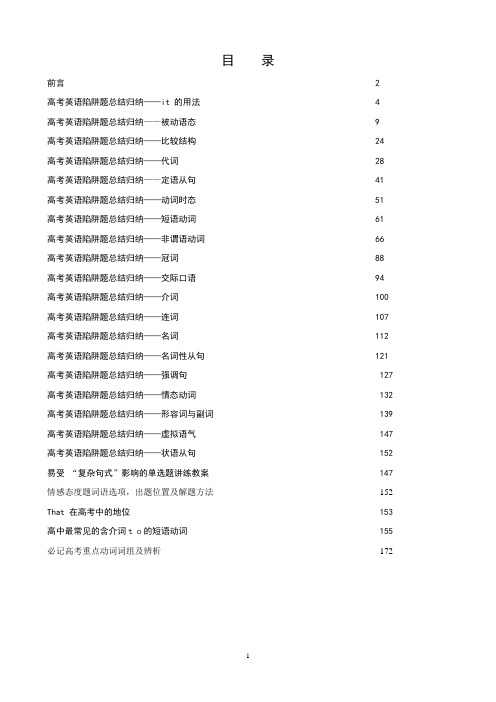
目录前言 2高考英语陷阱题总结归纳——it 的用法 4高考英语陷阱题总结归纳——被动语态 9高考英语陷阱题总结归纳——比较结构 24 高考英语陷阱题总结归纳——代词 28 高考英语陷阱题总结归纳——定语从句 41 高考英语陷阱题总结归纳——动词时态 51 高考英语陷阱题总结归纳——短语动词 61 高考英语陷阱题总结归纳——非谓语动词 66 高考英语陷阱题总结归纳——冠词 88 高考英语陷阱题总结归纳——交际口语 94 高考英语陷阱题总结归纳——介词 100 高考英语陷阱题总结归纳——连词 107 高考英语陷阱题总结归纳——名词 112 高考英语陷阱题总结归纳——名词性从句 121 高考英语陷阱题总结归纳——强调句 127 高考英语陷阱题总结归纳——情态动词 132 高考英语陷阱题总结归纳——形容词与副词 139 高考英语陷阱题总结归纳——虚拟语气 147 高考英语陷阱题总结归纳——状语从句 152 易受“复杂句式”影响的单选题讲练教案 147 情感态度题词语选项,出题位置及解题方法152 That 在高考中的地位 153 高中最常见的含介词to的短语动词 155 必记高考重点动词词组及辨析172前言基础题,人人会做,显不出优势;高难题,人人不会做,拉不开距离;陷阱题,表面看起来很容易,所需知识也不一定很难,但其中隐含机关,预设陷阱,尽管你完全具备做好此类题的知识和能力,但由于你理解角度不对、分析思路不活、做题方法不当、使用技法不巧等,可能自认为捡了个大便宜,而实际上却刚好掉入了命题人为你精心准备的陷阱。
不信你就看看下面几道题:1. She was so angry and spoke so fast that none of us understood _______ he said meant.A. thatB. whatC. that thatD. what what仔细想想看,选A还是选B?请给出你的决定——未作决定之前请不要往后看!你的分析可能是这样的:选项C和D 不太可能是正确答案,因为像这样两个“引导词”叠用的情况一般不可能。
经典陷阱题大串讲

2013高考英语经典陷阱题大串讲·定语从句1. The factory was built in a secret place, around _________ high mountains.A. which wasB. it wasC. which wereD. them were【陷阱】容易误选A或B,将A、B中的 which 和 it 误认为是其后句子的主语。
【分析】最佳答案是C,around which were high mountains 是一个由“介词+which”引出的非限制性定语从句,而在该从句中,主语是 high mountains,around which 是表语,所以句子谓语应用复数were,而不是用单数 was。
请做以下类例题目(答案均为C):(1) Yesterday we visited a modern hospital, around _________ some fruit shops.A. which isB. it isC. which areD. them are(2) The murder happened in an old building, beside ________ the city police station.A. which areB. it isC. which isD. them are(3) Next month we’ll move to a new building, next to _________ a nice restaurants where we can have Chinese food.A. which areB. it isC. which isD. them are2. A man with a bleeding hand hurried in and asked, “Is there a hospital around _________ I can get some medicine for my wounded hand?”A. thatB. whichC. whereD. what【陷阱】容易误选 B,认为 around 是介词,选 which 用以代替前面的名词 hospital,在此用作介词 around 的宾语。
2013高考陷阱题对比50例(附答案)
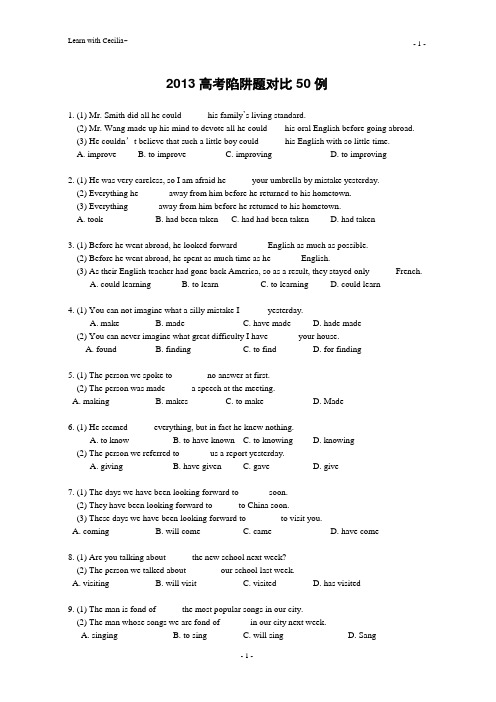
2013高考陷阱题对比50例1. (1) Mr. Smith did all he could _____ his family’s living standard.(2) Mr. Wang made up his mind to devote all he could ___ his oral English before going abroad.(3) He couldn’t believe that such a little boy could _____ his English with so little time.A. improveB. to improveC. improvingD. to improving2. (1) He was very careless, so I am afraid he _____ your umbrella by mistake yesterday.(2) Everything he ______ away from him before he returned to his hometown.(3) Everything ______ away from him before he returned to his hometown.A. tookB. had been takenC. had had been takenD. had taken3. (1) Before he went abroad, he looked forward ______ English as much as possible.(2) Before he went abroad, he spent as much time as he ______ English.(3) As their English teacher had gone back America, so as a result, they stayed only _____ French.A. could learningB. to learnC. to learningD. could learn4. (1) You can not imagine what a silly mistake I ______yesterday.A. makeB. madeC. have madeD. hade made(2) You can never imagine what great difficulty I have ______ your house.A. foundB. findingC. to findD. for finding5. (1) The person we spoke to _______ no answer at first.(2) The person was made _____ a speech at the meeting.A. makingB. makesC. to makeD. Made6. (1) He seemed _____ everything, but in fact he knew nothing.A. to knowB. to have knownC. to knowingD. knowing(2) The person we referred to ______ us a report yesterday.A. givingB. have givenC. gaveD. give7. (1) The days we have been looking forward to ______ soon.(2) They have been looking forward to _____ to China soon.(3) These days we have been looking forward to _______ to visit you.A. comingB. will comeC. cameD. have come8. (1) Are you talking about _____ the new school next week?(2) The person we talked about _______ our school last week.A. visitingB. will visitC. visitedD. has visited9. (1) The man is fond of _____ the most popular songs in our city.(2) The man whose songs we are fond of ______ in our city next week.A. singingB. to singC. will singD. Sang10. (1) Not only_____the jewelry she ____ been sold for her son’s gambling debts but also her house.(2) Never _____ he come unless he _____ his wallet back.A. will, hasB. has, hadC. has, hasD. /, has11. (1) _____ in thought, he almost ran into the car in front of him.(2) _____ his lovely dog, he looked for it everywhere.(3) _____ his dog, he took it in the scary bushes.A. LosingB. Having lostC. LostD. To lose12. (1) The research is so designed that once _____ nothing can be done to change it.A. beginsB. having begunC. beginningD. begun(2) _____ in the queue for almost half an hour, he suddenly realized that he forgot his code.A. Having waitedB. WaitedC. To waitD. Waiting13. (1) --- What do you think made the woman so upset? --- ____ weight.(2) --- What can I do to join in the league? --- _____ weight.A. As she put onB. Put onC. Putting onD. Because of putting on(3) --- Why are the students so diligent these days? --- _______ the entrance exams.A. PassB. To passC. PassingD. Having passed14. (1) Time should be made good use of _____ our lessons well.(2) Time should be spent _____ English by everybody at present.A. learningB. learnedC. to learnD. having learned15. (1) It was only with the help of the local guide ____.(2) It was snowing heavily _____.(3) Only with the help of the local guide _______.A. was the mountain climber rescuedB. then the mountain climber was rescuedC. when the mountain climber was rescuedD. that the mountain climber was rescued16. (1) Never _____ time come again.(2) Never _____ he _____ a single sheep.A. has …lostB. will …loseC. will …lostD. has…lose17. (1) --- ______ was it ____ they discovered the entrance to the underground palace?--- Totally by chance.(2) --- _____ was it _____ they discovered at the entrance to the underground palace? --- A helmet.A. What, thatB. How, thatC. When, howD. Where, that18. (1) I have nothing to confess. _______ you want me to say?(2) I hope you don’t mind, but _____ you were born?A. What is it thatB. What it is whatC. How is it thatD. Where is it that19. (1) Is this factory _______ you visited the other day?(2) Is this the factory _____ you visited the other day?A. the oneB. thatC. whereD. When20. (1) Was it ____ she heard with her ears ______ really made her frightened?(2) Was it _____ she had been _____ really made you all surprised?A. what, thatB. it, thatC. where, thatD. what, /21. (1) _______ what the six blind men said sounded!(2) You can’t imagine _____ he is acting.A. H(h)ow foolishlyB. H(h)ow foolishC. W(w)hat foolishD. W(w)hat foolishly22. (1) It was ______ the old clock the old man spent the whole morning at home.(2) It was three hours that the old man spent _____ the old clock.A. repairB. repairingC. to repairD. in repair23. (1) It was some time later ______ we realize the truth.(2) It was some time ______ we realize the truth.A. untilB. sinceC. beforeD. That24. (1) Please tell me the way you thought of ______ the garden.(2) Have you thought of _____ the garden?A. take care ofB. to take care ofC. taking care ofD. how to take care of25. (1) A fast-food restaurant is the place, ____________, just as the name suggests, eating is performed quickly.(2) A fast-food restaurant is the place, _______ you can eat quickly.(3) A fast-food restaurant is the place, _______ can perform you food quickly.A. whichB. whereC. thereD. What26. (1) The film brought the hours back to me _____ I was taken good care of in that far-away village.(2) The picture brought me back to the hours ___ I spent with the villagers when I was 12.A. untilB. thatC. whenD. Where27. (1) Scientists think that the continents _______ always where they _______ today.(2) Scientists think that the continents today _______ always where they _______.A. aren’t; areB. aren’t; wereC. weren’t; areD. weren’t; were28. (1) -- Where do you think _______ he _______ the computer? -- Sorry, I have no idea.(2) -- Where on earth _______ he _______ the computer? -- Sorry, I have no idea.A. had, boughtB. has, boughtC. did, buyD. /, bought29. (1) We should do more such exercises in the future, I think, _____ those we did yesterday.(2) We should do such exercises in the future, I think, _____ we did yesterday.(3) The teacher suggested that we should do _____ what he did yesterday.A. asB. likeC. aboutD. Than30. (1) He will tell you _______ he expects will win such a match.(2) He will tell you _______ of the teams he expects will win such a match.A. whyB. whomC. whichD. who40. (1) Thank you for the trouble you have _______ to help me.(2) Thank you for the unselfish help you have _____ to me.A. paidB. takenC. givenD. Asked41. (1) Who is it up ______ decide whether to go or not?(2) Who did you go _____ help the people in trouble?A. to …toB. for …forC. to …forD. with …to42. (1) We keep in touch ____ writing often.(2) We keep in touch _____ write to each other to comfort each other.A. withB. toC. onD. By43. (1)-- How long have you been here? --- _______ the end of last month.(2) --- When did you come here? --- _______ the end of last month, I think.(3) --- When shall we finish the project? --- _______ the end of this month, I think.A. InB. ByC. AtD. Since44. (1) You should treat him in the way ______ suits him most.(2) Please share the way with us _____ you study English.A. thatB. in whichC. howD. Why45. (1) He insisted that the sky ____ clear up the following day.(2) Mom insisted that he ____ wash his hands, but he insisted that he ____ washed them.A. wouldB. shouldC. hadD. Be46. (1) He is a strict but kind-hearted father, _______ the children respect but are afraid of.A. /B. thatC. for whomD. one whom(2)My most famous relative of all, _______ who really left his mark on America, was Rob Sussel,my great-grandfather.A. oneB. the oneC. heD. someone(3) He is a good man, _____ you can trust on all your life.A. aB. oneC. that oneD. Which47. (1) Mr. Smith is _______ a good teacher _______ we all respect.(2) Mr. Smith is _______ a good teacher _______ we all respect him.A. such, thatB. such, asC. so, thatD. so, as(3) I want to buy _____ book _____ he bought yesterday.A. the same, thatB. the same, asC. the same, likeD. the same, that(4) He is _____ teacher _____ the headmaster praised at the meeting in public.A. the same, thatB. the same, asC. the same, likeD. the same, that48. (1) ____ nice, the food was all eaten up soon.(2) ____ nice, the food should be made by adding more sugar.A. TastingB. TasteC. TastedD. To taste49. (1) You haven’t been to Beijing, have you?______. And how I wish to go there again.(2) --- You haven’t been to Beijing, have you?--- ______. But how I wish to go there.A. Yes, I have.B. Yes, I haven’tC. No, I haveD. No, I haven’t50. (1) He was sentenced to death _______ what he has stolen from the bank.(2) They were forced to leave their homeland _____ the Nazis got there and killed many people.A. thatB. sinceC. becauseD. because of参考答案1. BDA2. ACB3. CAB4. BB5. DC6. BC7. BAA8. AC9. AC 10. BA11. CBD 12. DA 13. CBB 14. CA 15. DCA16. CA 17. BA 18. AD 19. AB 20. AC21. BA 22. BB 23. CA 24. C/CD 25. BBA26. CB 27. BC 28. DC 29. DAB 30. DC31. CB 32. DA 33. AC 34. CA 35. DB36. BA 37. BA 38. D/AC 39. CA 40. BC41. AD 42. DB 43. DCB 44. A/AB 45. A/BC46. DBB 47. BABA 48. AD 49. AD 50. DC。
高考英语陷阱题归纳总结

高考英语陷阱题归纳总结高考英语作为一门重要科目,对于考生而言是一次重要的挑战。
在备考中,我们经常会遇到一些陷阱题,这些题目可能会导致我们的失分。
因此,本文将对高考英语中的陷阱题进行归纳总结,并提供策略来应对这些陷阱。
一、同义词替换陷阱在高考英语试题中,同义词替换是一种常见的陷阱形式。
考生在阅读理解和词汇填空题中常常会遇到这类问题。
这类题目常常会使用同义词替换原文中的关键词,以考查考生对词汇的掌握能力。
因此,我们需要通过广泛的阅读和积累词汇来增加自己对同义词的敏感性,从而更好地把握题意。
二、修饰语陷阱修饰语陷阱是一种常见的语法陷阱。
在选词填空、翻译和完形填空等题目中,我们经常会遇到修饰语陷阱。
这类题目常常通过对句子中修饰语的位置和形式进行调整,试图混淆考生对句子结构的理解。
因此,我们需要注意句子结构中修饰语的位置和作用,以避免被误导。
三、语境理解陷阱语境理解是高考英语试题中的难点之一。
考生在阅读理解和完形填空等题目中常常会遇到这类问题。
这类题目常常将重点放在考生对语篇整体的理解能力上,并试图通过迷惑性的选项来干扰考生的判断。
因此,我们需要通过多读多练的方式提高对语境的理解能力,以辨别正确答案。
四、逻辑推理陷阱逻辑推理是高考英语试题中的另一个难点。
在阅读理解和写作题中常常会涉及到逻辑推理。
这类题目试图考查考生对信息提取和推理能力的掌握程度。
因此,我们需要培养自己对信息的敏感性,通过积极阅读和思考来提高自己的逻辑推理能力。
五、易混淆词汇陷阱易混淆词汇是高考英语试题中的常见陷阱。
在选词填空和阅读理解等题目中,我们经常会遇到这类问题。
这类题目通过对词汇的选择和运用来考察考生的细致观察力。
因此,我们需要通过大量的练习和积累,加强对易混淆词汇的辨析能力,以避免被误导。
综上所述,高考英语陷阱题在考试中经常出现,对考生来说是一次重要的挑战。
通过了解和归纳这些陷阱的形式,我们可以有针对性地进行备考,提高应对陷阱题的能力。
高中英语真题-2013高考英语经典陷阱题大串讲·被动语态
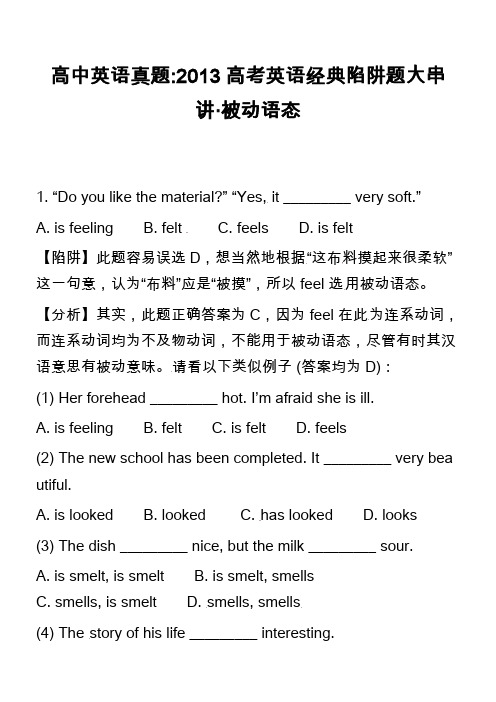
高中英语真题:2013高考英语经典陷阱题大串讲·被动语态1. “Do you like the material?”“Yes, it _________ very soft.”A. is feelingB. feltC. feelsD. is felt【陷阱】此题容易误选D,想当然地根据“这布料摸起来很柔软”这一句意,认为“布料”应是“被摸”,所以 feel 选用被动语态。
【分析】其实,此题正确答案为C,因为 feel 在此为连系动词,而连系动词均为不及物动词,不能用于被动语态,尽管有时其汉语意思有被动意味。
请看以下类似例子 (答案均为D):(1) Her forehead _________ hot. I’m afraid she is ill.A. is feelingB. feltC. is feltD. feels(2) The new school has been completed. It _________ very bea utiful.A. is lookedB. lookedC. has lookedD. looks(3) The dish _________ nice, but the milk _________ sour.A. is smelt, is smeltB. is smelt, smellsC. smells, is smeltD. smells, smells(4) The story of his life _________ interesting.A. is soundedB. is soundingC. has soundedD. sounds2. He was angry _________ your work. He said that he _________ at all.A. at, didn’t satisfyB. to, didn’t satisfyC. at, wasn’t satisfiedD. to, wasn’t satisfied【陷阱】几个干扰项均有可能被误选。
高考英语陷阱题总结归纳—比较结构(附详解)

高考英语陷阱题总结归纳—比较结构(附详解)高考英语陷阱题总结归纳——比较结构◆典型陷阱题分析◆1. How beautifully she sings! I have never heard _____ voice.A. a betterB. a bestC. the betterD. the best【陷阱】容易误选D,认为最高级前要用定冠词。
【分析】其实此题最佳答案为A,该句可视为…I have never heard a better voice than her voice 之省略,全句句意为―她唱得多好啊!我从未听过她这么好的声音‖。
请再看以下类似的实例:He is fine, never better. 他很好,比以往任何时候都好。
This bird is really lovely. I‘ve never seen a finer one. 这只鸟真可爱,我从未见过这样好看的鸟。
比较以下试题,情形也大致相同:(1) ―I‘ve never found a better job.‖ ―_______.‖A. I don‘t think soB. Too badC. CongratulationsD. Do n‘t worry答案选C,I‘ve never found a better job可视为I‘ve never found a better job than this job 之省略,句意为:我从来没有找到比这份工作更好的工作,即这是我所找到的最好的工作。
(2) ―What do you think of the service here?‖ ―Oh, ______. We couldn‘t have found a better place.‖A. too badB. sorryC. wonderfulD. impossible答案选C。
We couldn‘t have found a better place 可视为We couldn‘t have found a better place than this place,其意为―我们不可能找到一个比这个地方更好的地方‖,即―这是我们所能找到的最好的地方‖。
2013高考英语 经典陷阱题大串讲 it用法

1 2013高考英语经典陷阱题大串讲·
it用法 1. Everyone knows that _________ is dangerous to play with fire, but ______
___ is difficult is to prevent children from playing with fire. A. it, it B. what, what C. it, what D. what, it 【陷阱】很容易误选B,认为两空均考查形式主语。 【分析】最佳答案是D,第一空填形式主语真正的主语是其后的不定式 to play with fire。第二空填 what,what is difficult 是主语从句,注意 what is difficult 后的谓语动词 is。请做以下类似试题: (1)
I haven’t got any pens, and I want to borrow one. 我没有钢笔,我想借一支。(one = a pen)
I have two pens, and I can lend one to you. 我有两本支钢笔,我可以借一支。(one = a pen) I have a pen, and I can lend it to you. 我有一本钢笔,我可以把它借给你。(it = the pen) 在上面一题中,one 相当于 one 相当于 a repair shop。请做下面一题(答案选A): There is only one English-Chinese dictionary in that book-shop. I wonder if you still want to buy _________. A. it B. one C. another D. any 5. Will you see to _____ that my children are taken good care of while I am away? A. it B. me C. yourself D. them 【陷阱】几个干扰项均有可能误选。 【分析】最佳答案是A。it 为形式宾语,真正的宾语是空格后that引导的宾语从句。see to 意为“负责”、“注意”,其中的 to 为介词,不宜直接跟that引导的宾语从句,遇此情况可借助代词 it。请做下面两题,答案也是选 it: (1) I’ll see to _________ that all these letters will be sent to the post before twelve. A. it B. me C. which D. them (2)
【英语】2013高考英语经典陷阱题大串讲:非谓语动词
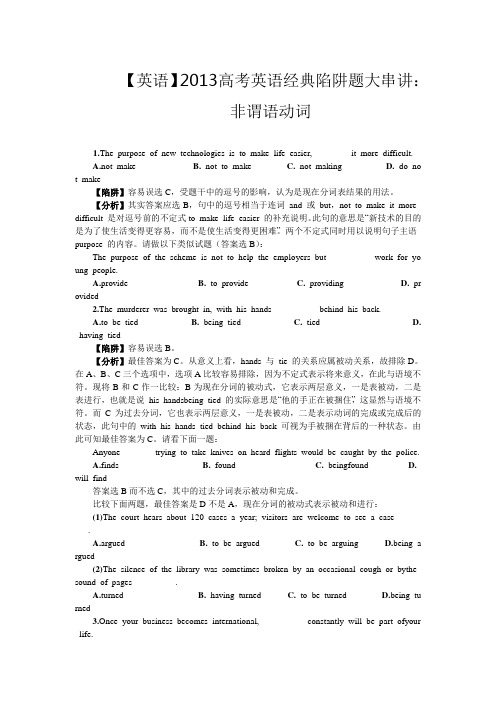
【英语】2013高考英语经典陷阱题大串讲:非谓语动词1.The purpose of new technologies is to make life easier, _______ it more difficult.A.not makeB.not to makeC.not makingD.do no t make【陷阱】容易误选C,受题干中的逗号的影响,认为是现在分词表结果的用法。
【分析】其实答案应选B,句中的逗号相当于连词and 或but,not to make it more difficult 是对逗号前的不定式to make life easier 的补充说明。
此句的意思是“新技术的目的是为了使生活变得更容易,而不是使生活变得更困难”。
两个不定式同时用以说明句子主语purpose 的内容。
请做以下类似试题(答案选B):The purpose of the scheme is not to help the employers but _________ work for yo ung people.A.provideB.to provideC.providingD.pr ovided2.The murderer was brought in, with his hands _________ behind his back.A.to be tiedB.being tiedC.tiedD. having tied【陷阱】容易误选B。
【分析】最佳答案为C。
从意义上看,hands 与tie 的关系应属被动关系,故排除D。
在A、B、C三个选项中,选项A比较容易排除,因为不定式表示将来意义,在此与语境不符。
现将B和C作一比较:B为现在分词的被动式,它表示两层意义,一是表被动,二是表进行,也就是说his handsbeing tied 的实际意思是“他的手正在被捆住”,这显然与语境不符。
而C为过去分词,它也表示两层意义,一是表被动,二是表示动词的完成或完成后的状态,此句中的with his hands tied behind his back 可视为手被捆在背后的一种状态。
高考英语典型陷阱题分类详解
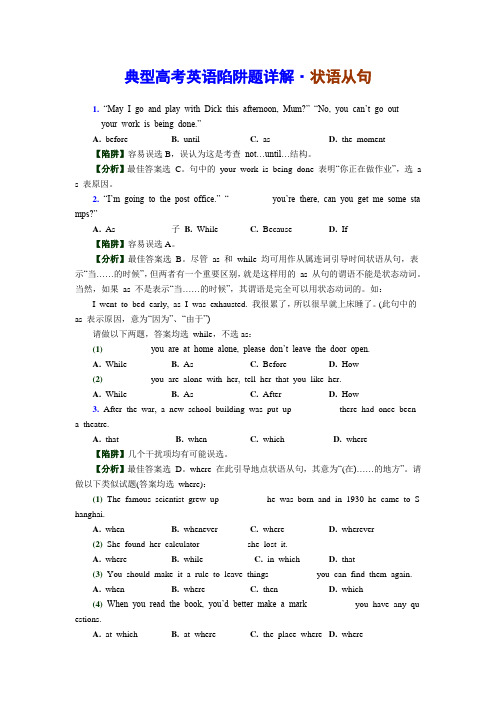
典型高考英语陷阱题详解·状语从句1.―May I go and play with Dick this afternoon, Mum?‖ ―No, you can’t go out ____ _____your work is being done.‖A.beforeB.untilC.asD.the moment【陷阱】容易误选B,误认为这是考查not…until…结构。
【分析】最佳答案选C。
句中的your work is being done 表明―你正在做作业‖,选a s 表原因。
2.―I’m going to the post office.‖ ―_________you’re there, can you get me some sta mps?‖A.As 子B.WhileC.BecauseD.If【陷阱】容易误选A。
【分析】最佳答案选B。
尽管as 和while 均可用作从属连词引导时间状语从句,表示―当……的时候‖,但两者有一个重要区别,就是这样用的as 从句的谓语不能是状态动词。
当然,如果as 不是表示―当……的时候‖,其谓语是完全可以用状态动词的。
如:I went to bed early, as I was exhausted. 我很累了,所以很早就上床睡了。
(此句中的as 表示原因,意为―因为‖、―由于‖)请做以下两题,答案均选while,不选as:(1)_________you are at home alone, please don’t leave the door open.A.WhileB.AsC.BeforeD.How(2)_________you are alone with her, tell her that you like her.A.WhileB.AsC.AfterD.How3.After the war, a new school building was put up _________there had once beena theatre.A.thatB.whenC.whichD.where【陷阱】几个干扰项均有可能误选。
高考英语单项选择填空八大陷阱透析课件

A. is to
B. to be
C. to are D. to going to be
3.母语干扰型 .
学外语最忌母语干扰,但由于 母语在大脑中根深蒂固,所以 常常会对外语学习者大脑中尚 不牢固的外语知识产生负面影 响。命题者也往往利用这一点, 制造陷阱。
陷阱一
I’ll come to see you if______.
A. to prevent, to live B. to prevent, from living C. to preventing, to live D. to preventing, living
陷阱二
The “Two Cities” referred _____ London and Paris.
2. The letter I have been looking
forward to ______ at last.
A. come B coming C. has come D . Came 思维定式
பைடு நூலகம்
3. Remind him ______ the window when
he leaves.
A. of closing B. closing
not ______their books during
examinations.
A. read
B. watch
C. notice
D. look at
思维定势是指人们在长期的思维 过程中所形成的一种固定的思维 模式。如果运用得当,会使我们 很快得出正确的结论;但若运用 不当,它便会误导考生掉入命题 人所预设的陷阱,得出错误的结 论。
A. you’re convenient B. it is convenient for you C. you feel convenient D. it is convenient with you
【英语】2013高考英语经典陷阱题大串讲:非谓语动词

【英语】2013高考英语经典陷阱题大串讲:非谓语动词1.The purpose of new technologies is to make life easier, _______ it more difficult.A.not makeB.not to makeC.not makingD.do not make【陷阱】容易误选C,受题干中的逗号的影响,认为是现在分词表结果的用法。
【分析】其实答案应选B,句中的逗号相当于连词and 或but,not to make it more difficult 是对逗号前的不定式to make life easier 的补充说明。
此句的意思是“新技术的目的是为了使生活变得更容易,而不是使生活变得更困难”。
两个不定式同时用以说明句子主语purpose 的内容。
请做以下类似试题(答案选B):The purpose of the scheme is not to help the employers but _________ work for yo ung people.A.provideB.to provideC.providingD.provided2.The murderer was brought in, with his hands _________ behind his back.A.to be tiedB.being tiedC.tiedD.having tied【陷阱】容易误选B。
【分析】最佳答案为C。
从意义上看,hands 与tie 的关系应属被动关系,故排除D。
在A、B、C三个选项中,选项A比较容易排除,因为不定式表示将来意义,在此与语境不符。
现将B和C作一比较:B为现在分词的被动式,它表示两层意义,一是表被动,二是表进行,也就是说his handsbeing tied 的实际意思是“他的手正在被捆住”,这显然与语境不符。
而C为过去分词,它也表示两层意义,一是表被动,二是表示动词的完成或完成后的状态,此句中的with his hands tied behind his back 可视为手被捆在背后的一种状态。
高考英语 陷阱题大串讲 形容词与副词类

落堕市安心阳光实验学校2013高考英语经典陷阱题大串讲·形容词与副词类1.We don’t care if a hunting dog smells _________, but we real ly don’t want him to smell _________.A. well, wellB. bad, badC. well, badlyD. badly, bad【陷阱】容易误选B,认为两个smell 均为连系动词,后接形容词作表语。
【分析】这是1995年的一道上海高考题,最佳答案为D。
句中的第一个 s mell 为实义动词,意为“闻气味”、“嗅觉”,smell badly 意为“嗅觉差”;第二个 smell 为连系动词,意为“闻起来(有某种气味)”,smell bad 意为“闻起来气味难闻”。
全句意为“我们并不介意一条猎狗的嗅觉不好,但我们的确不希望它的气味难闻”。
2.“_________ do you think of your English teacher?” “Oh, he is an _______ man.”A. What, interestingB. What, interestedC. How, interesting D. How, interested【陷阱】容易误选D,认为第一空应填 how,表示“如何”;第二空应填interested,因为有的书上说–ing 形容词主要说明事物,-ed 形容词主要说明人。
【分析】其实最佳答案应是A。
英语中表示汉语的“你觉得……如何?”时,可用How do you like ...? 或 What do you think of ...? 注意两者搭配不同,即 like 与 how 搭配,think of 与 what 搭配。
另一方面,有的书认为:-ing形容词说明事,-ed形容词说明人。
此说法在很多情况下是可行的,但表述欠严谨。
高考英语 经典陷阱题大串讲 时态
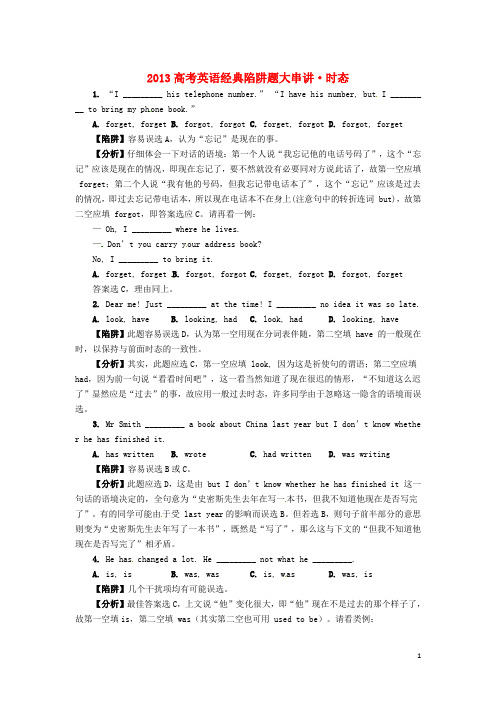
2013高考英语经典陷阱题大串讲·时态1.“I _________ his telephone number.” “I have his number, but I _______ __ to bring my ph one book.”A. forget, forgetB. forgot, forgotC. forget, forgotD. forgot, forget【陷阱】容易误选A,认为“忘记”是现在的事。
【分析】仔细体会一下对话的语境:第一个人说“我忘记他的电话号码了”,这个“忘记”应该是现在的情况,即现在忘记了,要不然就没有必要同对方说此话了,故第一空应填 forget;第二个人说“我有他的号码,但我忘记带电话本了”,这个“忘记”应该是过去的情况,即过去忘记带电话本,所以现在电话本不在身上(注意句中的转折连词 but),故第二空应填 forgot,即答案选应C。
请再看一例:— Oh, I _________ where he lives.—Don’t you carry y our address book?No, I _________ to bring it.A. forget, forgetB. forgot, forgotC. forget, forgotD. forgot, forget答案选C,理由同上。
2. Dear me! Just _________ at the time! I _________ no idea it was so late.A. look, haveB. looking, hadC. look, hadD. looking, have【陷阱】此题容易误选D,认为第一空用现在分词表伴随,第二空填 have 的一般现在时,以保持与前面时态的一致性。
【分析】其实,此题应选C,第一空应填 look, 因为这是祈使句的谓语;第二空应填had,因为前一句说“看看时间吧”,这一看当然知道了现在很迟的情形,“不知道这么迟了”显然应是“过去”的事,故应用一般过去时态,许多同学由于忽略这一隐含的语境而误选。
高中英语真题-2013高考英语经典陷阱题大串讲·情态动词
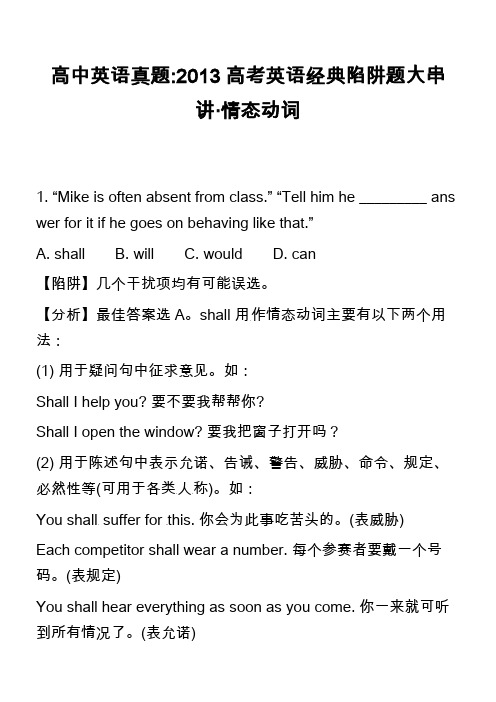
高中英语真题:2013高考英语经典陷阱题大串讲·情态动词1. “Mike is often absent from class.”“Tell him he _________ ans wer for it if he goes on behaving like that.”A. shallB. willC. wouldD. can【陷阱】几个干扰项均有可能误选。
【分析】最佳答案选A。
shall 用作情态动词主要有以下两个用法:(1) 用于疑问句中征求意见。
如:Shall I help you? 要不要我帮帮你?Shall I open the window? 要我把窗子打开吗?(2) 用于陈述句中表示允诺、告诫、警告、威胁、命令、规定、必然性等(可用于各类人称)。
如:You shall suffer for this. 你会为此事吃苦头的。
(表威胁)Each competitor shall wear a number. 每个参赛者要戴一个号码。
(表规定)You shall hear everything as soon as you come. 你一来就可听到所有情况了。
(表允诺)请做以下试题(答案均选 shall):(1) “I promise that she _________ get a nice present on her birth day.”“Will it be a great surprise to her?”A. shouldB. mustC. wouldD. shall2. You ________ pay too much attention to your reading skill, as it is so imp ortant.A. cannotB. shouldn’tC. mustn’tD. needn’t【陷阱】几个干扰项均有可能误选。
【分析】最佳答案选A。
高考英语 经典陷阱题大串讲 介词类
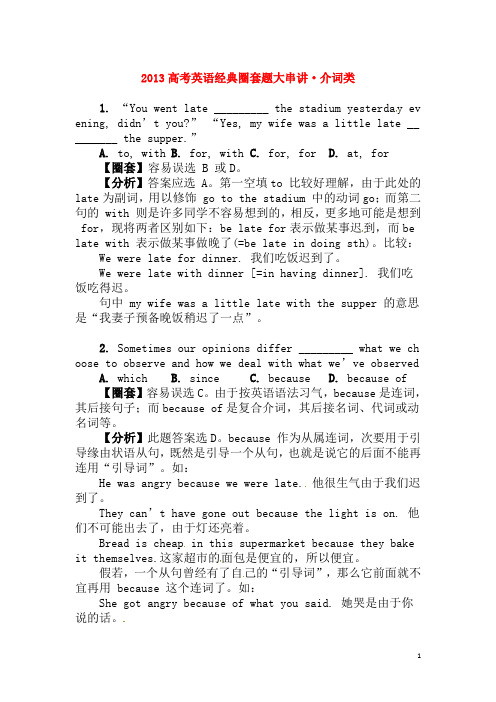
2013高考英语经典圈套题大串讲·介词类1.“You went late _________ the stadium yesterda y ev ening, didn’t you?” “Yes, my wife was a little late __ _______ the supper.”A. to, withB. for, withC. for, forD. at, for【圈套】容易误选 B 或D。
【分析】答案应选 A。
第一空填to 比较好理解,由于此处的late为副词,用以修饰 go to the stadium 中的动词go;而第二句的 with 则是许多同学不容易想到的,相反,更多地可能是想到 for,现将两者区别如下:be late for表示做某事迟到,而be late with 表示做某事做晚了(=be late in doing sth)。
比较:We were late for dinner. 我们吃饭迟到了。
We were late with dinner [=in having dinner]. 我们吃饭吃得迟。
句中 my wife was a little late with the supper 的意思是“我妻子预备晚饭稍迟了一点”。
2. Sometimes our opinions differ _________ what we ch oose to observe and how we deal with what we’ve observedA. whichB. sinceC. becauseD. because of【圈套】容易误选C。
由于按英语语法习气,because是连词,其后接句子;而because of是复合介词,其后接名词、代词或动名词等。
【分析】此题答案选D。
because 作为从属连词,次要用于引导缘由状语从句,既然是引导一个从句,也就是说它的后面不能再连用“引导词”。
演漏市慢寨学校高考英语 陷阱题大串讲 情态动词
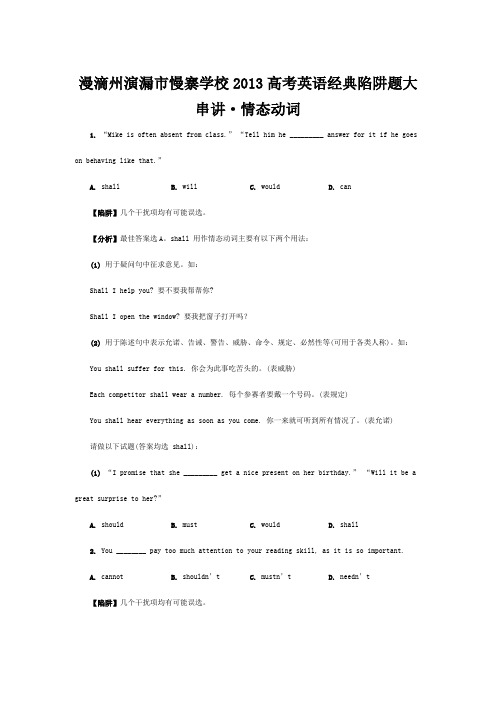
漫滴州演漏市慢寨学校2013高考英语经典陷阱题大串讲·情态动词1.“Mike is often absent from class.” “Tell him he _________ answer for it if he goes on behaving like that.”A. shallB. willC. wouldD. can【陷阱】几个干扰项均有可能误选。
【分析】最佳答案选A。
shall 用作情态动词主要有以下两个用法:(1)用于疑问句中征求意见。
如:Shall I help you? 要不要我帮帮你?Shall I open the window? 要我把窗子打开吗?(2)用于陈述句中表示允诺、告诫、警告、威胁、命令、规定、必然性等(可用于各类人称)。
如:You shall suffer for this. 你会为此事吃苦头的。
(表威胁)Each competitor shall wear a number. 每个参赛者要戴一个号码。
(表规定)You shall hear everything as soon as you come. 你一来就可听到所有情况了。
(表允诺)请做以下试题(答案均选 shall):(1)“I promise that she _________ get a nice present on her birthday.” “Will it be a great surprise to her?”A. shouldB. mustC. wouldD. shall2. You ________ pay too much attention to your reading skill, as it is so important.A. cannotB.shouldn’tC.mustn’tD.needn’t【陷阱】几个干扰项均有可能误选。
【分析】最佳答案选A。
- 1、下载文档前请自行甄别文档内容的完整性,平台不提供额外的编辑、内容补充、找答案等附加服务。
- 2、"仅部分预览"的文档,不可在线预览部分如存在完整性等问题,可反馈申请退款(可完整预览的文档不适用该条件!)。
- 3、如文档侵犯您的权益,请联系客服反馈,我们会尽快为您处理(人工客服工作时间:9:00-18:30)。
2013高考英语经典陷阱题大串讲·比较结构
1. How beautifully she sings! I have never heard _________ voice.
A. a better
B. a best
C. the better
D. the best
【陷阱】容易误选D,认为最高级前要用定冠词。
【分析】其实此题最佳答案为A,该句可视为…I have never heard a better voice than her voice 之省略,全句句意为“她唱得多好啊!我从未听过她这么好的声音”。
请再看以下类似的实例:
He is fine, never better. 他很好,比以往任何时候都好。
This bird is really lovely. I’ve never seen a finer one. 这只鸟真可爱,我从未见过这样好看的鸟。
比较以下试题,情形也大致相同:
(1)“I’ve never found a better job.” “_________.”
A.I don’t think so
B. Too bad
C. Congratulations
D.Don’t worry
答案选C,I’ve never found a better job可视为I’ve never found a better j ob than this job 之省略,句意为:我从来没有找到比这份工作更好的工作,即这是我所找到的最好的工作。
(2)“What do you think of the service here?” “Oh, _________. We couldn’t have found a better place.”
A. too bad
B. sorry
C. wonderful
D. impossible
答案选 C。
We couldn’t have found a better place 可视为We couldn’t have fo und a better place than this place,其意为“我们不可能找到一个比这个地方更好的地方”,即“这是我们所能找到的最好的地方”。
(3) Boris has brains. In fact, I doubt whet her anyone in the class has ___ ______IQ.
A. a high
B. a higher
C. the higher
D. the highest
答案选B,句意为“……我怀疑班上有没有哪个人比他智商更高”,即“我认为他可能是班上智商最高的”。
(4). How cold it is! We’ve never had _________ this winter.
A. the colder day
B. a cold day
C. the coldest day
D. a colder day
答案选D。
句意为“今年冬天我们还从未遇上过这样冷的日子”。
2. Professor White has written some short stories, but he is _________ know n for his plays.
A. the best
B. more
C. better
D. the most
【陷阱】容易误选D。
【分析】此题首先不宜选B或D,因为 well known 的比较级和最高级通常是 better known和best known,有时也可以是 more well known 和 most well known,但通常不能
是 more known 和 most known。
至于是选A还是C,这就要看语境。
由于句中涉及的只有stories 和 plays 两个对象,故应选比较级。
3.You are _________ careful than your brother. You two can’t do the work that needs care and skill.
A. not more
B. no more
C. not less
D. no less
【陷阱】容易误选A。
【分析】要做对此题,首先要正确理解以下结构的含义:
not more … than = 不如……
no more … than = 和……一样不 (否定两者)
not less … than = 不如……不 (即指不如 less 后形容词的反面)
no less … than = 和……一样 (肯定两者)
比较以下各句的意思:
You are more careful than he is. 你比他仔细。
You are not more careful than he is. 你不如他仔细。
You are no more careful than he is. 你和他一样不仔细。
You are less careful than he is. 你不如他仔细(你比他粗心)。
You are not less careful than he is. 你比他仔细(你不如他粗心)。
You are no less careful than he is. 你和他一样仔细。
通过以上分析,再结合句子语境,可知此题最佳答案为B。
4.“Oh, how fat he is!” “But I think he i s _________ than fat.”
A. short
B. shorter
C. more short
D. shortest
【陷阱】容易误选B。
认为 short为单音节形容词,故用-er构成比较级。
【分析】其实正确答案应是C。
要弄清此问题,得先从比较句型的两种不同类型说起:
(1)异类同质比较:即指两个不同的人或事物(异类)在同一方面(同质)进行比较。
如:
My room is smaller than yours. 我的房间比你的小。
Our country is more powerful than theirs. 我们的国家比他们的国家更强大。
(2)同类异质比较:即指同一个人或事物(同类)在两个不同的方面(异质)进行比较,这类句子常译为“(更多的)是……,而不是”、“与其……不如……”等。
如:He was more lucky than clever.他是靠运气而不是靠聪明。
She was mare surprised than angry. 她感到更多的是惊讶而不是生气。
This is more a war movie than a western. 这更应当说是一部战争片,而不是西部片。
按英语习惯,在进行同类异质比较时,只能用more构成比较级,不能用-er形式,即使是单音节词也是如此。
